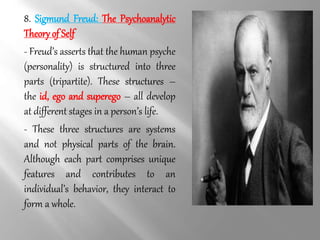UNSELF-MODULE-1.pptx
- 1. Why are you in this subject? College life is said to be the most challenging and exciting phase of your life. It is an entirely new adventure that everyone looks forward to. It is a world different from your primary as well as junior and senior high schools. Since you are in College, everything-including this subject- is new to you. You belong to this college so it is important to know and learn how to interact with your fellow students. Learn to live together in peace and harmony with yourself and whole school community.
- 2. Activity: Sharing Oneself ïą Your complete name ïą Your positive attribute or characteristic that begins with the first letter of your surname ïą The school where you came from ïą Your reason for studying in this institution ïą You feeling to be in this class
- 3. Questions: ïą Who am I? ïą How would you describe yourself? ïą Dou you love yourself? Why or why not? ïą What are you most grateful for in life? ïą What are the biggest and most important things you have learned in life so far?
- 4. Lesson 1 Concept and Nature of Self
- 5. 1. Socrates: KnowYourself - The famous line of Socrates, âKnow yourself,â tells each man to bring his inner self to light. Knowing oneâs own virtue is necessary and can be learned. The Philosophical View of Self
- 6. 2. Plato: The Ideal Self, the Perfect Self - According to Plato, man was omniscient or all-knowing before he came to be born into this world. With his separation from the paradise of truth and knowledge and his long exile on earth, he forgot most of the knowledge he had. However, by constant remembering through contemplation and doing good, he can regain his former perfections.
- 7. 3. Immanuel Kant: Respect for Self - Man is the only creature who governs and directs himself and his actions, who sets up ends for himself and his purpose, and who freely orders means for the attainment of his aims. A person should not be used as a tool, instrument, or device to accomplish anotherâs private ends. Thus, all men are persons gifted with the same basic rights and should treat each other as equals.
- 8. 4. Rene Descartes: âI think, therefore I amâ - Descartes states that the self is a thinking entity distinct from the body. His famous principle was âCogito, ergo sum,â which means âI think, therefore I am.â Although the mind and the body are independent from each other and serve their own function, man must use his own mind and thinking abilities to investigate, analyze, experiment and develop himself.
- 9. 5. John Locke: Personal Identity - Personal identity is the concept about oneself that evolves over the course of an individualâs life. It may include aspects of life that man has no control over, such as where he grow up or the color of his skin, as well as the choices he makes, like how he spends his time and what he believes.
- 10. 6. David Hume: The Self is the Bundle Theoryof Mind - For him, man has no âclear and intelligibleâ idea of the self. He posits that no single impression of the self exists; rather, the self is just the thing to which all perceptions of a man is ascribed. Hume asserts that what we call the âselfâ is really just âa bundle or collection of different perceptions which succeed each other with an inconceivable rapidity.â
- 11. 7. St. Augustine: Love and Justice as the Foundation of the Individual Self - St. Augustine believes that a virtuous life is dynamism of love. It is a constant following of and turning towards love while a wicked life is a constant turning away from love. Loving God means loving oneâs fellowmen; and loving fellowmen denotes never doing any harm to another or, as the golden principle of justice states, doing unto others as you would have them do unto you.
- 12. 8. Sigmund Freud: The Psychoanalytic Theory of Self - Freudâs asserts that the human psyche (personality) is structured into three parts (tripartite). These structures â the id, ego and superego â all develop at different stages in a personâs life. - These three structures are systems and not physical parts of the brain. Although each part comprises unique features and contributes to an individualâs behavior, they interact to form a whole.
- 13. Partsof Personality 1. Id (internal desires) Also called interval desires or instinctive drives, it consists of the bodyâs primitive biological drives and urges which are concerned only with achieving pleasure and self- satisfaction. Id lives completely in the unconscious. 2. Ego (reality) It is the âIâ part of the individual that gives him/her sense of his/her own identity. The ego is the rational part of the personality. 3. Superego (conscience) It is the part of the personality concerned with morals, precepts, standards and ideas. The superego is also the critical faculty of the personality.
- 15. 9. Erik Erikson: The Psychosocial Stages of Self- development - Erikson was primarily concerned with how both psychological and social factors affect the development of individuals. He defined a crisis is not âa threat of catastrophe but a turning point, a crucial period of increased vulnerability and heightened potentialâ. Accordingly, individuals develop a healthy personality by mastering âlifeâs outer and inner dangers.â















